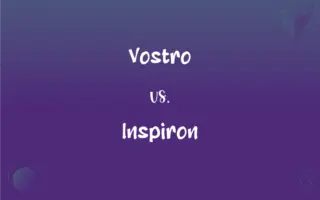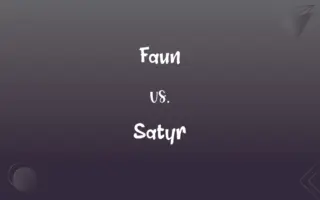Cover Letter vs. Covering Letter: What's the Difference?
Edited by Aimie Carlson || By Janet White || Published on February 23, 2024
A cover letter is a document sent with a resume to provide additional information on skills and experience, while a covering letter is just an alternative term for the same document.

Key Differences
Both a cover letter and a covering letter serve the same purpose: they are documents accompanying a resume, offering additional details on one's skills and experience for a job application. The difference lies primarily in terminology, not function.
The term "cover letter" is more commonly used in American English, while "covering letter" is often found in British English. However, both terms are understood and used interchangeably in professional contexts.
There is no difference in the format or content between a cover letter and a covering letter. Both typically include an introduction, a body discussing qualifications, and a conclusion with a call to action.
The purpose of both a cover letter and a covering letter is to provide a personalized introduction to a potential employer, highlighting how one's skills and experiences make them a suitable candidate for the position.
Comparison Chart
Regional Preference
More common in the United States
More common in the United Kingdom
ADVERTISEMENT
Terminology Usage
More modern and widely recognized
More traditional and less common
Format and Structure
Standard professional format
Same as cover letter
Purpose
To introduce and highlight skills
Identical purpose as cover letter
Perception in Professional Setting
Generally the preferred term
Seen as interchangeable with cover letter
Cover Letter and Covering Letter Definitions
Cover Letter
A document outlining an applicant's reasons for interest in a position.
My cover letter highlighted my enthusiasm for environmental advocacy, aligning with the company's mission.
ADVERTISEMENT
Covering Letter
A supplementary note to a potential employer about one's job application.
The covering letter I sent emphasized my quick adaptation to new technologies.
Cover Letter
A means to elaborate on experiences listed in a resume.
In the cover letter, I detailed my role in increasing sales by 30% in my previous job.
Covering Letter
An applicant's first chance to make an impression on a potential employer.
My covering letter aimed to make a strong impression with my communication skills and leadership experience.
Cover Letter
A formal letter accompanying a resume, detailing a candidate's qualifications.
Please find attached my resume and cover letter for the Marketing Manager position.
Covering Letter
A written introduction tailored to a specific job, accompanying a CV or resume.
In my covering letter, I explained how my academic background makes me a fit for the research role.
Cover Letter
A narrative form of presenting one’s professional background and skills.
The cover letter I wrote for the job explained my transition from sales to marketing.
Covering Letter
A letter sent with a resume explaining the applicant's credentials and interest in the open position.
I attached a covering letter with my application to describe my previous job responsibilities.
Cover Letter
A personalized introduction to a prospective employer in a job application.
In my cover letter, I emphasized my leadership skills and previous project management experience.
Covering Letter
A professional document providing context to a resume for job applications.
My covering letter provided a detailed account of my achievements in customer service.
FAQs
What is a covering letter?
A covering letter is another term for a cover letter, often used in British English.
What is the purpose of a covering letter?
The purpose of a covering letter is to introduce yourself to an employer and explain your suitability for a role.
How long should a cover letter be?
A cover letter should typically be one page long.
What is a cover letter?
A cover letter is a document sent with a resume to provide more information on your skills and experience.
Should I always send a cover letter with my resume?
It's generally recommended to send a cover letter unless the job listing specifically says not to.
Can I use the same covering letter for different jobs?
No, you should tailor your covering letter to each specific job.
Should I include personal information in a cover letter?
Include only relevant personal information, like how your background makes you a good fit for the job.
What format should a cover letter follow?
A cover letter should follow a standard business letter format.
What tone should I use in a cover letter?
Use a professional and positive tone in a cover letter.
How do I address a cover letter?
Address the cover letter to the hiring manager, if their name is known, or use a general greeting.
How do I end a covering letter?
End with a polite closing and a call to action, such as requesting an interview.
Is a covering letter necessary for online applications?
Yes, a covering letter can be beneficial for online applications to introduce your application.
Can a covering letter be in email form?
Yes, a covering letter can be the body of an email when sending a resume electronically.
Is customization important in a cover letter?
Yes, customizing your cover letter to each job application is crucial.
Should my covering letter repeat what's on my resume?
No, it should complement your resume, not repeat it.
What's the difference in content between a cover letter and a covering letter?
There's no difference in content; both serve to elaborate on skills and experiences relevant to the job.
Can I use bullet points in a cover letter?
Yes, bullet points can be used to highlight key accomplishments.
Is it okay to show personality in a cover letter?
Yes, a touch of personality can make your cover letter stand out, but keep it professional.
What's the biggest mistake to avoid in a cover letter?
Avoid being too generic; tailor your cover letter to each job and company.
How specific should I be in a covering letter?
Be as specific as possible about your skills and how they apply to the job.
About Author
Written by
Janet WhiteJanet White has been an esteemed writer and blogger for Difference Wiki. Holding a Master's degree in Science and Medical Journalism from the prestigious Boston University, she has consistently demonstrated her expertise and passion for her field. When she's not immersed in her work, Janet relishes her time exercising, delving into a good book, and cherishing moments with friends and family.
Edited by
Aimie CarlsonAimie Carlson, holding a master's degree in English literature, is a fervent English language enthusiast. She lends her writing talents to Difference Wiki, a prominent website that specializes in comparisons, offering readers insightful analyses that both captivate and inform.
































































